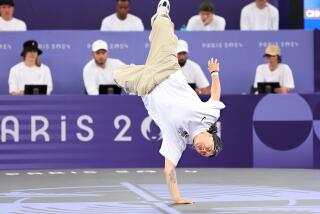She Has to Share Spotlight
- Share via
There were so many firsts in these Olympics that the one completed this day, by Los Angeles’ own Valerie Brisco-Hooks, didn’t seem to resonate as much as it should have.
It happened on a day that England’s Daley Thompson, an outspoken character who liked to leave the impression that he and Princess Anne were an item, won the decathlon. It was also a day that Evander Holyfield, clearly the class of the boxing light-heavyweight division, was defaulted in a controversial semifinal that cost him the gold medal.
Nevertheless, the 200/400 gold-medal double that Brisco-Hooks completed with her 21.81 seconds in the 200 marked the first time that double had been completed in an Olympics. Not just the first time for women. The first time ever. In fact, that feat wasn’t matched until Atlanta in 1996, when both Michael Johnson and Marie-Jose Perec did it.
That also meant that Brisco-Hooks, wife of former Philadelphia Eagle receiver Alvin Hooks and mother of a 2-year-old son, could match the record of three gold medals by a woman track athlete. That was achieved in Rome 24 years before by Wilma Rudolph, a woman about whom Brisco-Hooks had read and been inspired. And that was taken care of two days later, when Brisco-Hooks ran on the winning U.S. 1,600-meter relay team.
Finishing second in that 200 was Florence Griffith, who would go on to marry triple-jump gold medalist Al Joyner, become the famous Flo-Jo of the Seoul Olympics and, tragically, die a few years ago of a seizure in her sleep. Finishing third was Merlene Ottey, who will compete in Athens.
Thompson’s decathlon victory was achieved at the expense of the same person it usually was, world-record holder Jurgen Hingsen of West Germany. For Thompson, it was the second consecutive decathlon gold, matching the mark of Bob Mathias, and the sixth time in six tries in direct competition with Hingsen. Asked if he was surprised he defeated Hingsen so easily, Thompson replied, “No, I always do.”
When he had clinched his victory, Princess Anne, president of the British Olympic Assn., stepped down to the Coliseum floor to congratulate him, to the delight of dozens of British tabloid writers.
Holyfield’s situation was best captured by the headline in The Times the next day: “Holyfield Stopped by 4-Letter Word.” That four-letter word had been “stop,” and according to the Yugoslavian referee who disqualified Holyfield, that’s what he had told the American boxer coming out of a clinch a split second before Holyfield clocked his opponent. The crowd booed, the U.S. boxing team protested and the fighter whose hand was raised in victory told Holyfield that he, New Zealander Kevin Barry, didn’t deserve to win.
So, as is usually the case in an Olympic sport that almost always leaves some sort of bad odor hanging over its event, officials ruled that Barry had won, but that Holyfield would at least get a bronze. And who won the gold? Well, gee. A Yugoslavian.
Carl Lewis’ sister, Carol, finished ninth in the long jump and was too distraught to meet the press. Tennis player Kathy Horvath claimed that the American crowd rooted against her in a match she lost to Yugoslavia’s Sabrina Goles and was so upset by that she said afterward, “I’m ashamed to be an American.”
The headline on the advance story for the U.S. men’s basketball game against Spain for the gold medal said it all: “They Are Going to Go Ahead With It Anyway,” and the Spanish coach, sounding like he didn’t want to, said, “We must play the game.”
An interesting stir only made its way to the back pages. San Gabriel doctor Robert Kerr, now deceased, said that “more than a dozen” of his track athlete patients had won medals while using performance-enhancing drugs banned by Olympic rules. Dr. Kerr, who wouldn’t name any of them because of doctor-patient privilege, said he was amazed that none of them were caught, especially since some of them had stopped using the stuff two to three weeks before they competed.
Dr. Tony Daly, now the Clippers’ doctor but then the Olympic medical director, set things straight. “Our system is foolproof,” Daly said.
More to Read
Go beyond the scoreboard
Get the latest on L.A.'s teams in the daily Sports Report newsletter.
You may occasionally receive promotional content from the Los Angeles Times.







